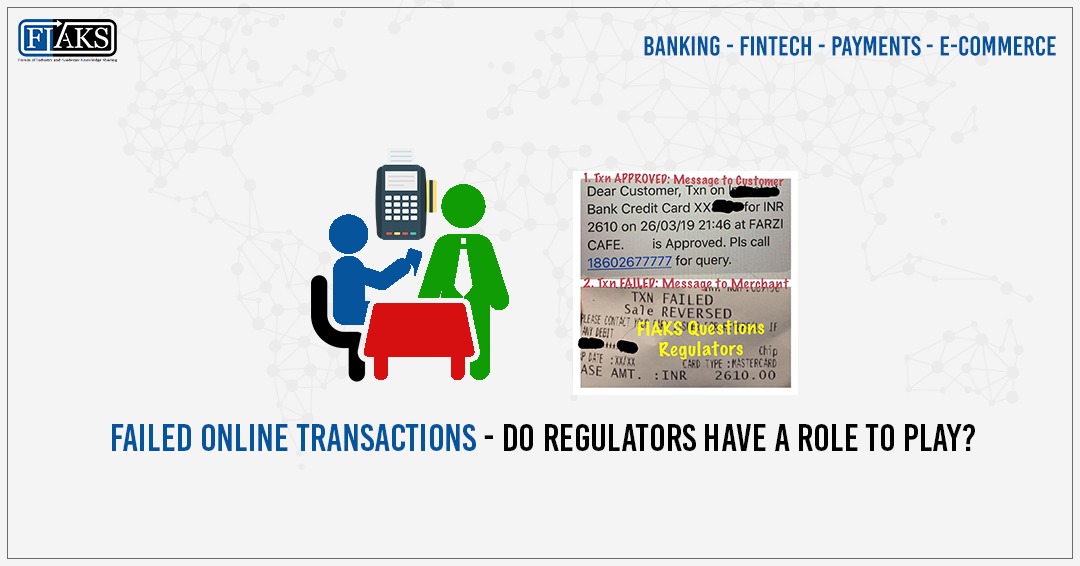Several Founders, Co-Founders, CXO Bankers, CXO Fintech professionals & people who participated in the ePanel discussions are:
- Mr. Varun Sakhuja, Director-Innovation management, Mastercard Labs Asia-Pacific
- Mr. Piush Kothari, Business Head Digital, Customer Analytics, and Strategy, Aditya Birla Idea Payment Bank
- Mr. Shirsha Ghosh, Co-Founder, Torit Innovations
- Mr. Sandeep Todi, Co-founder, Remitware Payments Inc
- Mr. Sunil Kulkarni, Joint Managing Director, Oxigen Services (India) Pvt Ltd
- Mr. Prabhu Ram, Managing Director & Group CEO at Payswiff
- Mr. John Choudhury, Head – Payments, Partnerships & Co-brand Cards, Flipkart
- Mr. Vikas R Panditrao, Co-Founder, Forum of Industry Academic Knowledge Sharing
- Many other CEO/CXO Bankers & Fintech professionals on FIAKS Forum who participated as anonymous
Failed online transaction? Why does this situation occur? Some of us have experienced that, when an online transaction is made to a particular merchant, the amount is debited from our account but it fails to reach the merchant.
In the group below failed transaction was shared. For an instance –
- Customer – Receives a message that Rs. 2610, is approved and paid
- Merchant – Receives a message that the transaction of Rs. 2610, has failed
So, what exactly happened here? Is the money, that the customer paid, lost forever? Or Can the money be retrieved? How regulators are monitoring the issues faced by customer & merchant?
Both customer is correct as success message received and the merchant is also correct as it has received the failed transaction. It’s important that the regulator issues a circular that makes bank responsible and not make customer/merchant run around

The Bankers argue that regulatory authority plays no role in such scenarios. As there is only a fraction of the segment, that face the payment failure due to poor network connectivity. The online transaction held from the customer to the merchant involves four different parties. When a transaction is made, it is approved from the issuer switch and hence a notification is sent to the customer. However, sometimes, due to poor network connectivity, the message from acquirer switch fails to reach the merchant (Point of Sale) PoS and hence, the transaction gets timed out. To tackle such a situation, the acquirers have a process built in. Which includes, the merchant when they settle the transaction on PoS terminal at the end of the day submitting only one approved the transaction. Hence, the customers are not billed twice. Hence, the failure of payment is a temporary scenario and the money deducted is automatically reversed. And, the intervention of the regulatory authority is not mandatory. Drawing a similar instance, if a person’s call drops on a prepaid phone. the resolution is provided by the service provider and not TRAI.
The Poor Network Connectivity Problem:
Sometimes, the problem occurs from the connectivity issue in the bank. Where the money is forwarded from the issuer/bank, but the message loop between the issuer and payment gateway or between the payment gateway and merchant is not closed. Hence, the customer receives a message from the issuer and merchant from the payment gateway, that the transaction has failed.
The scenario usually occurs in the Tier3 and Tier 4 cities, where network connectivity is a huge challenge.
So, shouldn’t the bank then compensate for the customer or the merchant? Well, ideally the bank doesn’t charge the customer or the merchant for the particular transaction.
The situation is frequent in Tier 3 and Tier 4 cities, but not only limited to them. Even, Tier 1 and Tier 2 cities, do face similar repercussions if the transaction made fails due to poor network connectivity or situation such as, a customer receiving a call during the transaction process, which disrupts the network connectivity. The situation occurs because the transaction is approved at the issuer level but the PoS device failed to receive the response within a stipulated time. To resolve such a situation, the system will perform a corn analysis and identify such duplicate transactions and eliminate the failed ones.
In such situations, the bank processes an instant refund to the customer’s account, within 10 days. If the debit card is used from Public Sector Undertakings (PSU) banks it generally takes longer turn around time (tat) on the refund.
The UPI Scams:
Register & Read the entire report

